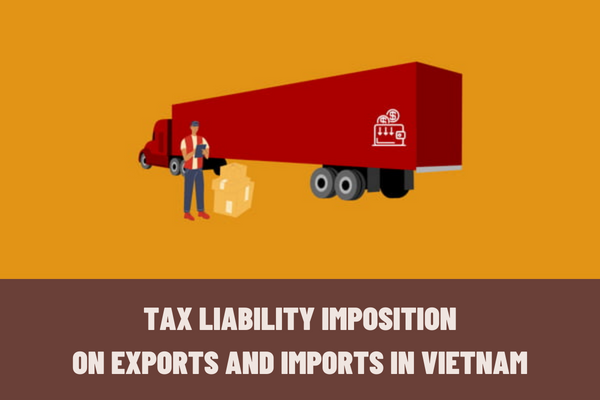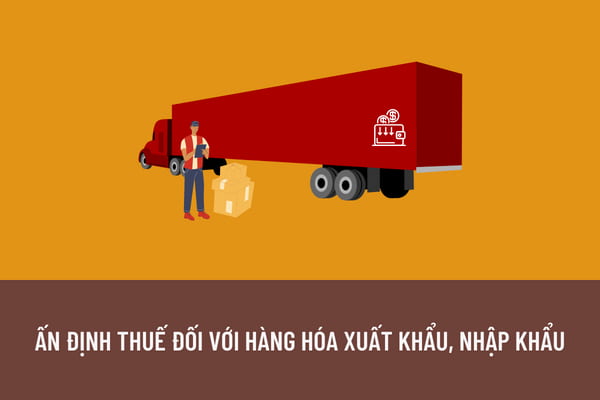If the taxpayer is not able to calculate the amount of tax payable, will he/she be subject to tax liability imposition in Vietnam?
- In what cases do customs authorities in Vietnam impose tax liability on exports and imports?
- Which agency has the authority to issue decisions on tax liability imposition?
- If the taxpayer is not able to calculate the amount of tax payable, will he/she be subject to tax liability imposition in Vietnam?
In what cases do customs authorities in Vietnam impose tax liability on exports and imports?
Pursuant to the provisions of Clause 4, Article 17 of Decree No. 126/2020/ND-CP, specifying the cases in which customs authorities in Vietnam shall impose tax liability on exports and imports as follows:
- Tax liability shall be imposed by the customs authority in the cases specified in Clause 1 Article 52 of the 2019 Law on Tax Administration in Vietnam. To be specific:
+ The taxpayer includes illegal documents in the customs dossier, application for tax exemption, reduction, refund or cancellation.
+ The taxpayer fails to provide or accurately and adequately provide information relevant to the determination of tax obligations; incorrectly declares the eligibility for tax exemption, reduction, refund or cancellation; fails to submit a report or schedule or submits inaccurate report to the customs authority; fails to supplement or fully and accurately supplement the tax declaration dossier on schedule as requested by the customs authority.
+ The taxpayer fails to provide, refuses to provide or delays providing accounting records, documents and data relevant to the determination of tax payable or tax exempt, reduced, refunded or cancelled.
+ The taxpayer fails to prove, explain or punctually prove, explain the determination of tax obligations as prescribed by law.
+ The taxpayer fails to implement the decision on tax audit or post-customs clearance inspection within 10 working days from the receipt of the decision; fails to implement the tax inspection decision within 15 days from the day on which it is announced and the customs authority has ample basis to impose tax liability, unless the time limit for tax audit, tax inspection or post-customs clearance inspection is extended.
+ The taxpayer fails to provide or adequately and fully provide data from the accounting books to determine tax obligations.
+ The customs authority has ample evidence or basis for concluding that the declared value is untruthful.
+ Fraudulent transactions are committed in a manner that affects the amount of tax payable.
+ The taxpayer is not able to calculate the amount of tax payable.
+ The imports are eligible for tax exemption or not subject to tax but repurposed or sold domestically by the taxpayer without declaring and paying tax on the new customs declaration as prescribed by law; raw materials and supplies are imported after 05 years from the commencement date of a project eligible for special investment incentives or a project of investment in an extremely disadvantaged area and thus no longer eligible for tax exemption but the taxpayer fails to declare and pay tax; in-country exports or imports are not conformable with tax, customs and trade laws.
+ The imports are distrained and put up for auction before customs procedures are completed under a decision of a competent authority or the court and become subject to tax, in which case the customs authority shall impose tax liability an inform the authority that collects the auction payment, except confiscated imports under the state ownership.
+ The imports are exempt from tax or pledged by the declarant as collateral for loans; Collateral is liquidated to recover debts but the taxpayer has not prepared a new customs declaration, has not fully paid tax in accordance with customs laws.
+ In other cases where the customs authority, inspection or audit authority carries out an inspection or audit at the taxpayer’s premises or at the customs authority as prescribed in Point b Clause 2 Article 21 and Point b Clause 2 Article 22 of the Law on Tax Administration and discovers that the taxpayer fails to declare or incorrectly declares the amount of tax eligible for exemption, reduction, refund or cancellation.
If the taxpayer is not able to calculate the amount of tax payable, will he/she be subject to tax liability imposition in Vietnam?
Which agency has the authority to issue decisions on tax liability imposition?
According to the provisions of Clause 7, Article 17 of Decree No. 126/2020/ND-CP, the Director of the General Department of Customs, Directors of Provincial Customs Departments, Post-customs Clearance Inspection Departments and district-level customs departments have the authority to issue, revise, cancel decisions on tax liability imposition.
If the taxpayer is not able to calculate the amount of tax payable, will he/she be subject to tax liability imposition in Vietnam?
According to the provisions of Point i, Clause 4, Article 17 of Decree No. 126/2020/ND-CP on cases where the tax authorities have imposed the payable tax amount, in which there is a case where the taxpayer is not able to calculate the amount of tax payable.
Thus, in this case, the tax authority will make tax imposition based on: commodity name, code, quantity, origin, value, tax rate, presumptive tax, mixed tax; tax accounting method; customs dossier; accounting records and electronic data stored by the enterprise and the customs authority; inspection result or verdict given by a competent authority or court judgment/verdict, other documents and information relevant to the exports or imports.
LawNet
